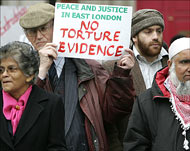UK-US extradition treaty under attack
Legal experts, politicians and activists in the United Kingdom plan to use the 4 July American Independence Day to lobby against a ‘one-sided’ extradition arrangement between the two nations.

Titled ‘Extradition Independence’, the meeting in London’s House of Commons on Monday will bring a panel of prominent British personalities to demand an end to the 2003 UK-US Extradition Treaty.
Members of Parliament (MP) Boris Johnson and Sadiq Khan, as well as Liberal Democrats Constitutional Affairs spokesman Lord Goodhart, are some of the leading lawmakers pushing for the treaty to be revoked.
Human rights lawyers Hugo Charlton, Gareth Pierce and James Welch added their weight to the lobby through a statement released on Saturday.
“Since the UK-US Extradition Treaty of 2003 was signed, the US has demanded the extradition of over 40 British citizens without having to provide any evidence.
“Even if the US ratifies the treaty, Britain cannot seek the extradition of any US citizen without first proving a case in a US court … British citizens have inferior rights compared to their American counterparts,” the statement said.
Cases in point
Four extradition cases are being pursued by London on Washington’s behalf. MP Johnson has taken up the cause of three bankers in connection with the Enron fraud case in the US.
|
“The US has demanded the extradition of over 40 British citizens without having to provide any evidence … [but] Britain cannot seek the extradition of any US citizen without first proving a case in a US court “ Anti-Extradition lobby group’s press statement |
Slamming the UK’s Home Office Minister Charles Clarke for pressing ahead with the extradition, Johnson said: “It is an absolute disgrace that these men may now be carted off to some Texas jail without even the protection of a preliminary hearing in this country.
“We need urgently to amend the Extradition Act 2003 in such a way that it requires the United States to supply prima facie evidence to accompany any extradition request – as the UK currently has to do in relation to any extradition from the US”.
“It is patently obvious that until such an amendment has been made to this lopsided treaty, the Government should defer approving the extradition to the United States of any British subjects”.
Babar Ahmad
The fourth extradition case involves computer programmer Babar Ahmad, who is accused of fund-raising for terrorist groups, but was released by an embarrassed British police after a medical report documented physical abuse while in custody.
MP Khan has said Ahmad should be tried in the UK. But Ahmad’s wife says that British police have no evidence with which to prosecute and the US has not provided any information to justify its extradition request.
Speaking to Aljazeera.net, she added that Monday’s meeting would “increase public knowledge of an unjust law by which British citizens cannot seek justice in their own country”.
Some 60 MPs have already signed a petition for the legislation to be debated in Parliament, she said.
“We need to stop a situation where British Muslims – who cannot be prosecuted under the law of the land – are sent abroad and face a justice system that allows execution.”
Controversial legislation?
The Extradition Act, which was fast-tracked into UK legislation in 2003, allows the UK to extradite any individual to the US without the accused having the right to challenge evidence provided by the US in a British court of law.
 |
|
Babar Ahmad’s supporters plan to |
However, the Home Office told Aljazeera.net on Sunday that it rejected criticisms of the Treaty as unfounded and inaccurate. Spokeswoman Helen Bower said the Extradition Act 2003 contained important safeguards.
“For the first time the provisions of the Human Rights Act were incorporated into the Extradition Act 2003 itself and therefore a District Judge cannot order a person’s extradition if he or she believes that would amount to a serious breach of their human rights.
“Even if extradition is ordered there is a right of appeal to the High Court”, she added.
Defending the law
And while the spokeswoman accepted evidential requirements for extradition requests from the US had changed, the US still needed to provide information in sufficient detail to establish dual criminality in the UK courts – which entails a full description of the alleged conduct, she said.
“The UK does not require prima facie evidence from any of the 40 countries that have signed the European Convention on Extradition, and this has not given rise to any problems.
“So we see no need to impose a more stringent requirement in respect of the USA,” she said.
Bower added that extradition with the US “is not a one-way process”. Between 1 January 2004 to 30 April 2005, two individuals were surrendered to the UK from the US compared to nine individuals surrendered by the UK to the US.